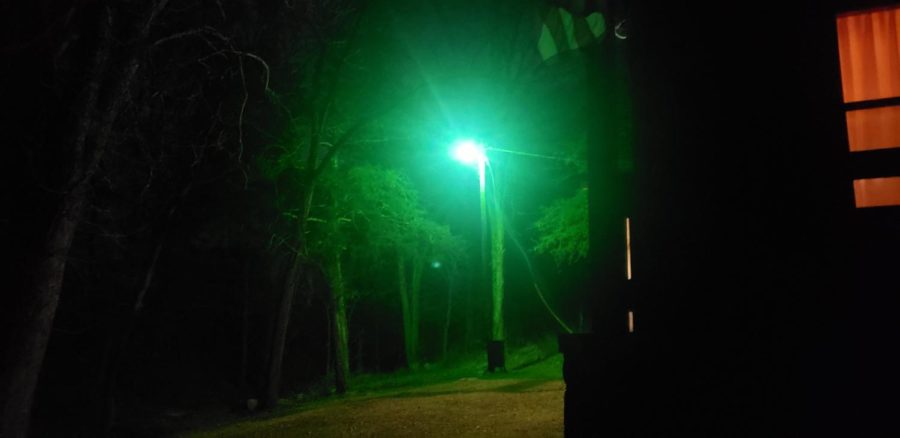Shiralkar: At the edge of reality: Examining liminal spaces
February 1, 2021
Over Christmas break last year, some friends and I took a trip to an isolated cabin in Arkansas. We’d tested negative for COVID before leaving and after returning to Ames. All four of us experienced something interesting in or around the cabin, individually — I’ll elaborate in a bit. We’d hoped (well, we’d discussed the possibility but gave its serious consideration a rather wide berth) to experience something paranormal at the cabin, but only some of us did. I experienced something else entirely — I walked into a liminal space.
If Latin was to be considered a “real” language, the word “limen” means “threshold,” a place of entry, or of exit. Victor Turner, an anthropologist who specialized in transitional phases in culture, built upon the concept of “liminality” as conceived in 1961 by a folklorist named Arnold van Gennep. In his 1961 book entitled “The Ritual Process: Structure and Anti-Structure (Foundations of Human Behavior),” Turner discussed the concept of culture as a constant struggle between structure and anti-structure.
Liminal spaces are such places or locations that invoke a sense of transition — of passing through. Van-Gennep talks about a sort of rite of passage, in which an individual shifts between stages. This comes in three steps: the individual first experiences a symbolic detachment from society and the idea of the self. Then comes utter isolation from society, followed by the reintegration of the individual back into society, along with fresh understandings and beliefs. I didn’t go through this whole spiel during my short experience, but it was pretty eerie.
After a warm dinner, for about 20 minutes, my friends and I were stargazing. It was a dark, moonlit night in Arkansas. The meadows rustled softly for miles in front of us and the wind whispered about board games and rogue rodents. I was wandering by myself around the property when I found this tall lamppost with a bright white light at the top. At first, it felt a bit odd to gaze at that pure brightness in the middle of the night. Avid documenter that I am, I immediately sought to capture the frame. The moment I opened the camera app and pointed it at the lamppost, a mild chill ran down my spine. For some reason, the light was green.
After it became apparent the light was actually appearing green in my phone, I considered the scene more somberly. There was no light inside the cabin, and the forest directly behind the lamppost cast a very cold glow around it. I felt like I didn’t exist in the moment. The feeling was distinct from an out-of-body experience that comes with grade reports on a Monday. No, it felt surreal. I was getting a gentle torrent of vague memories from my childhood, deep within my brain. Staring at graffiti in a faraway town, clutching at my favorite stuffed toy while listening to muffled conversations, walking home in the rain by myself after a particularly adventurous evening. It was amazing while the feeling lasted.
For some reason, I didn’t bother mentioning this to my friends, who later thought a ghost was shoving them down the stairs (a bit strange, if you ask me), but this idea of existing in a transition has stayed with me all my life. In Hindu mythology, there’s a popular story regarding the in-between — the place between places. A demon is killed by a god on a doorstep at dusk with bear claws because the demon was blessed to not die at any extremes (day/night, by man/beast, by hand/weapons). You can read more about it here. Change is an inevitable part of our lives — it’s what lends us the quality of being human.
There’s an old Tumblr post that describes the eerie feeling of nothingness quite succinctly, just existing in a motel with no identity. Before I sought professional help and snapped out of it, I tended to dissociate frequently and start thinking about nothing. My experience with the lamppost reminded me of that feeling — knowing that something is to come, and something is slipping away, leaving me in a metaphysical limbo of sorts. Even in the “new semester begins!” message from President Wendy Wintersteen, she acknowledges this transitional phase between phases, embodied by the ancient two-headed Roman god Janus, who looks both to the future and into the past.
Mere months from graduation, I find myself in a similar phase, like I’m in the middle of a persistent déjà vu. Ames, the gorgeous place where I think I came of age, seems like a distant memory. Meanwhile, I find myself plagued by sleepless nights in pursuit of stable employment, which will lead me away from the place I now call home. These days, I tend to wait till sundown, then don a nice shadowy outfit and walk around town, chasing down places with this kind of unnerving, melancholy aura. You can usually find me in abandoned parking lots, staring at lonely lampposts, wondering if I’m any different from them. These are interesting times, I think. Wash your hands and wear your mask.







